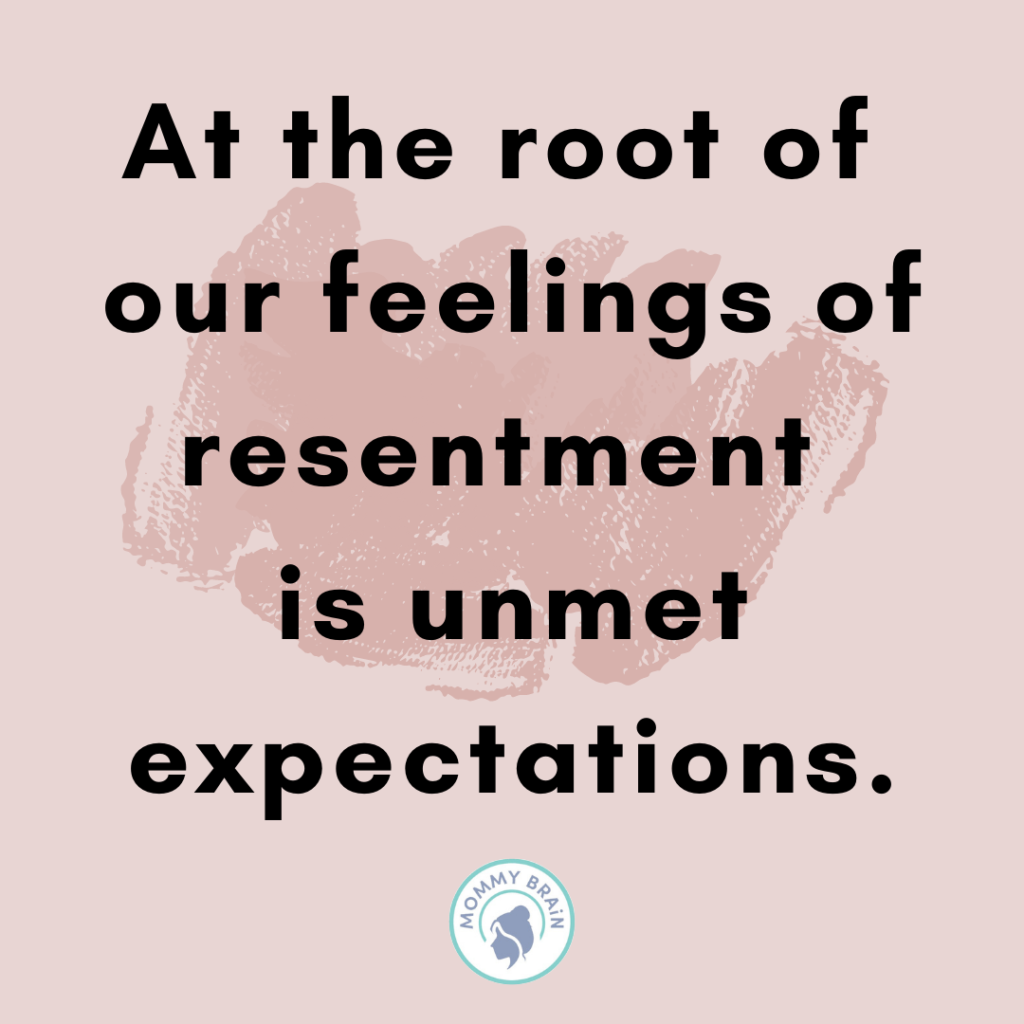The partner resentment after baby or children that happens can take us by surprise. You may have had thoughts of parenthood with your significant other looking a certain way…and nowhere in those musings was resentment. It’s a feeling that’s not openly talked about, yet it’s so incredibly common. We’ve all struggled with these emotions – the frustration that builds or the bitterness that bubbles as we move through our day-to-days with unmet expectations (whether warranted or not).
“It really just stems from these persistent, unwanted thoughts about what happened or didn’t happen,” shares Clinical Psychotherapist Kay Priester. “And [these thoughts] leave us with feelings of anger and a certain amount of other feelings about our position in that moment of time.”
Sound familiar? Maybe you’ve been the one always having to wake up in the middle of the night with your crying child. Or the go-to parent for all things childcare-related. And why does your partner not see certain tasks needing to be done around the home or needing to be asked to do said tasks, instead of just doing it without prompting. It’s frustrating as hell and beyond exhausting to be the one carrying the brunt of the mental and physical load.
In these moments, what are the expectations you have of your partner? What are the expectations your partner has of you? How have these been communicated?
effects of resentment
According to Priester, when resentment goes unchecked it creates rifts in our relationships. We can all relate to this in some way, amiright? Raise your hand if you’ve thought and/or said: “Well, you should just know why I’m upset.” We’ve been there too. And while needing to tell our partners the “why” behind our anger or frustration can make us feel even more frustrated, it is necessary because they aren’t mind-readers (as much as we really, really want them to be).
“Resentment really deprives us of being able to create authentic relationships, because there’s this gap between the two people,” says Priester.
She also adds that in bringing up the rift, especially in the all-too-common occurrence of carrying more of the child-rearing or household-managing responsibilities, your partner might jump into “fixing mode”. While inadvertently ignoring a key piece of your experience, which is that you’re feeling these emotions in the first place. So how do we begin to navigate this?
3 Ways To Navigate Partner Resentment After Baby
1. Calling yourself in
Having a call in requires us to pause, assess what it is we’re feeling and why, and allow ourselves to welcome a different outcome. It requires radical forgiveness – the forgiveness that says I’m in control of how I feel and I’m going to choose to do something different. Maybe that’s not sitting in these feelings of anger to prove a point or maybe it’s speaking up and letting your partner know what your expectation was.
Here are some questions to ask yourself:
- What are the beliefs, expectations, and perceptions I hold about parenting? About splitting the mental load or household management? About raising our child(ren)?
- Do I think my partner should be doing things a certain way? How do I feel when they don’t? Are these expectations realistic? Have my expectations been communicated?
- What was I expecting to happen vs what actually happened? And how did that outcome make me feel?
“There is power and importance in welcoming different outcomes,” says Priester. “Honoring the fact that we have these feelings and knowing that they don’t last forever. They’re designed to move through us. It’s when we hold on to them – that’s when conflict blows up.”
2. Connecting the present with the past
Parenthood forces us in a sense to reckon with our own upbringing. To peel back the layers on generational learnings and past events that have helped mold the beliefs and perceptions we hold. How did you feel when an expected action or outcome wasn’t met? How do these feelings show up now with your partner?
These feelings start from somewhere. Priester suggests asking yourself: “what are the feelings coming up? What are the beliefs that I’ve developed about myself? And then how do I challenge that?”
3. Letting the resentment go
Whew, this one is hard. It can be incredibly difficult to let go of these feelings. Maybe we watched our own parents or caregivers stay angry instead of talking through the emotions.
A place to start is to ask yourself: is holding on to the resentment serving me or costing me?
It’s also important to answer for yourself what you believe needs to happen before you let the resentment go. What are the specific outcomes or resolutions you are looking for when feelings of resentment arise? Does your partner need to:
- Recognize why they should be doing something without you having to tell them
- Acknowledge that they fell short and will try to do better next time
- Apologize
- All of the above
“It’s like a dance, right?,” shares Priester. “On the one-hand we know that the acknowledgment [from our partner] is something that we value, but on the other hand, we know the physical and mental effects of holding on to resentment.”
This is where having that self-awareness about ourselves comes into play, and the understanding that by creating a new experience towards the resentment, we’re showing grace.
We want our partners to present in a certain way, and that too requires self-awareness on their part. When we knowingly hold on to resentment we create this gap, but what would happen if we brought it up instead of waiting for our partners to figure out what we were feeling on their own?
At its core, resentment stems from the unmet expectations, whether warranted or not, we hold. As you start peeling back the layers on the beliefs, expectations, and perceptions you hold, what comes up?
Join Mommy Brain, where members can have open and honest discussions about all the parts of motherhood — including the partner resentment after baby that arises. There are many layers to who we are as women and as mothers. Mommy Brain provides expert-led guidance and community that is relatable, empathetic, and judgment-free to help you navigate every part of motherhood. Join us.
Ravelle Worthington is a wife, momma of three, and the founder of Mommy Brain.




Leave a Reply